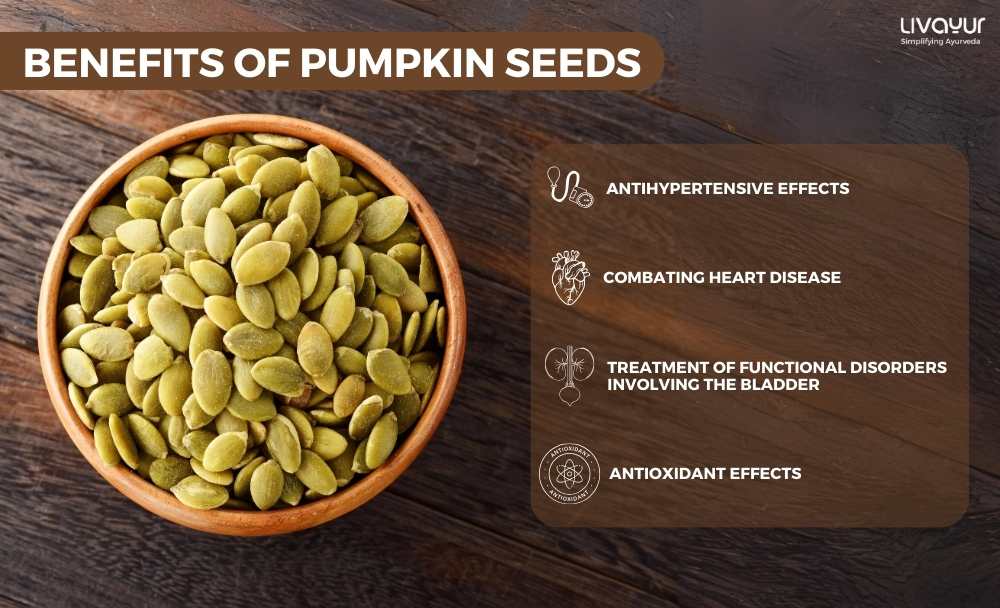
Pumpkin seeds, which are commonly referred to as pepitas, are flat seeds encased in a yellowish-white husk. These seeds are found inside the fully-grown pumpkin. Pumpkin seeds contain vital phyto compounds, including oxalate, nitrate, phytate, and cyanide, among others. The seeds also provide optimum quantities of protein, fiber, antioxidants, magnesium, unsaturated fat, and more. You can enjoy pumpkin seeds as a snack, as an ingredient for various recipes, or in multiple products such as pumpkin seed-based protein powder, pumpkin seed butter, and pumpkin seed tofu.
Fitness-conscious people love to take pumpkin seeds in a roasted form. The Sterols and Vitamin E in pumpkin seeds increase a lot when roasted.
Due to its rich nutritional profile, pumpkin seeds are being consumed widely all over the world these days. There are several pumpkin seeds benefits, and in this article, we have summarized the benefits of pumpkin seeds from the Ayurvedic point of view. Read on to learn more:
Nutritional value of pumpkin seeds
Here’s a table showing the nutritional value of pumpkin seeds:
| Nutrient | Quantity per 100g |
| Calories | 574 |
| Fat | 49g |
| Fiber | 6.6g |
| Protein | 30g |
| Vitamins | B1, B2, B3, B5, B6, B9, C, E, K |
| Minerals | Calcium, Iron, Magnesium, Manganese, Phosphorus, Potassium, Sodium, Zinc |
Pumpkin seeds benefits
1. Treats bladder disorders
For several years, pumpkin seed oil has been used to obtain relief from the difficulties that are associated with enlargement of the prostate gland and micturition problems that are associated with an irritable bladder. Pumpkin seeds have a tonic influence on the bladder as well as sphincter relaxation. Lipid components of the oil derived from pumpkin seeds have been found to reduce bladder as well as urethral pressure, while simultaneously improving bladder compliance.
2. Protects against heart diseases
It has been successfully found that pumpkin seeds modulate numerous risk factors for cardiovascular disease. In one study, researchers found that when rats were specifically induced with atherosclerosis and then supplemented with pumpkin seeds for 37 days, there was a significant increase in high-density lipoprotein (HDL) or “good” cholesterol as well as a 47% reduction in total cholesterol, along with a reduction of 78% of low-density lipoprotein (LDL) or “bad” cholesterol. The possible primary reason for the seeds’ cholesterol-lowering effects can be attributed to their high concentrations of phytosterols. [1]
3. Lower blood pressure
Researchers from Egypt proved the antihypertensive properties of pumpkin seed oil. These researchers caused hypertension in rats through inhibition of the nitric oxide synthase. These rats were then successfully administered pumpkin seed oil or “amlodipine,” which is an antihypertensive medication, for 6 weeks. Results of the study demonstrated that pumpkin seed oil was as effective as amlodipine when it came to reversing elevated blood pressure in rats through the restoration of nitric oxide levels close to normal. Moreover, pumpkin seeds contain tryptophan, which may be responsible for exerting blood-pressure-lowering effects. [1]
4. Reduces the chances of breast cancer
Phytoestrogens in pumpkin seeds can protect against breast cancer. This compound mimics the estrogen female hormone and has the power to reduce the chances of breast cancer in postmenopausal women. [1]
5. High antioxidants content
Pumpkin seeds are full of antioxidants such as phenolic acids and flavonoids. Carotenoids and vitamin E are also present in trace amounts in them. Antioxidants can shield your cells from damaging free radicals and lessen inflammation. Consuming meals high in antioxidants can therefore help prevent a variety of ailments. It is believed that pumpkin seeds’ strong antioxidant content contributes to their beneficial health effects. [1]
6. Blood sugar-lowering capacity
Pumpkin, pumpkin seeds, pumpkin seed powder, and pumpkin juice can lower blood sugar, according to some earlier animal research. After a high-carb meal, participants in a study with healthy individuals who ate meals containing 65 g (about 2 oz) of pumpkin seeds showed reduced blood sugar levels. It’s interesting to note that pumpkin seeds’ high magnesium concentration might be the cause of their beneficial effects on diabetes. Over 28 years, a major observational study revealed that individuals with the highest magnesium consumption had a 15% lower chance of developing type 2 diabetes than those with the lowest consumption.[1]
7. Extremely high in magnesium
Pumpkin seeds are the richest source of magnesium. This mineral fuels over 300 reactions in the human body, including maintaining muscle and nervous system function, supporting a healthy immune function, maintaining a steady heartbeat, and strengthening the bones. The mineral also helps the body produce energy and manage blood sugar levels.
8. Immunity booster
Pumpkin seeds contribute significantly to the immune system with their vitamin E and zinc content. Vitamin E fortifies immune responses while acting as a powerful antioxidant, protecting cells from damage by free radicals. Zinc, on the other hand, shields the body from inflammation, allergies, and pathogens, enhancing overall immunity. Apart from this, pumpkin seeds exhibit antimicrobial, antifungal, and antiviral properties. [4]
9. Improves sleep quality
The amino acid tryptophan found in pumpkin seeds facilitates better sleep. It serves as a precursor to serotonin and melatonin, aiding in the induction of restful sleep. [1]
10. Weight management aid
Abundant in proteins and fiber, pumpkin seeds promote a feeling of fullness, reducing overall food intake and subsequent calorie consumption. This property assists in weight management efforts by curbing appetite and prolonging satiety.[5]
11. Bone health support
Pumpkin seeds benefits are also because of their high magnesium levels, essential for bone growth and strength. Adequate magnesium intake correlates with increased mineral density in bones, reducing the risk of fractures and conditions like osteoporosis. [4]
12. Prostate health and fertility
Consuming pumpkin seeds can alleviate symptoms of Benign Prostatic Hyperplasia (BPH) and potentially reduce the risk of prostate cancer due to their zinc content. Moreover, these seeds might aid in improving sperm quality and boosting fertility in men. [1] [6]
13. Pregnancy benefits
The zinc in pumpkin seeds is beneficial during pregnancy, promoting healthy immunity and contributing to the baby’s growth. The iron content manages the issue of anemia in pregnant women. Taking pumpkin seeds during pregnancy improves the appetite. [3]
14. Mental health aid
Magnesium in pumpkin seeds aids in fighting depression, and stress reduction, potentially lowering anxiety levels and promoting a calmer mind. [1]
15. Hair and skin health
Pumpkin seeds provide nutrients beneficial for hair strength, hair regrowth, silkiness, and shine. [2] Additionally, they contribute to healthier skin by keeping it soft, preventing wrinkles, and reducing acne risk.
How to consume pumpkin seeds?
Preparing pumpkin seeds is a simple process. Follow these steps to consume pumpkin seeds:
1. Prepare the Seeds: Extract seeds from the pumpkin by cutting an opening, and scooping out the seeds and pulp into a bowl.
2. Clean and Separate: Rinse seeds under cold water, separating them from any remaining pulp using fingers or a strainer.
3. Boil to Soften: In a saucepan, cover seeds with water, adding a pinch of salt. Boil, then simmer for 10 minutes to soften the seeds.
4. Season for taste: Drain seeds and place them in a bowl. Add preferred seasonings like olive oil, salt, paprika, garlic powder, or cayenne pepper. Toss for an even coat.
5. Roasting Process: Preheat oven to 300°F (150°C). Spread seasoned seeds on a baking sheet. Roast for 20-30 minutes, stirring occasionally until golden and crispy.
6. Cool and Store: Allow roasted seeds to cool before storing them in an airtight container. They are now ready to be consumed as a nutritious snack.
7. Consume in a variety of forms: Pumpkin seeds are versatile and offer various consumption options. Roasting them as a snack is a popular choice, but they’re also available in oil and butter forms. You can also add these seeds to various foods like smoothies, yogurt, fruits, salads, soups, cereals, bread, cakes, energy bars, and stir-fries to enhance their flavor and nutritional value.
Recipes that use pumpkin seeds
There are many ways one can incorporate pumpkin seeds into their recipes. Here are a few ideas:
- Roast them:
- Add a little olive oil to the pan
- Add the pumpkin seeds
- Add spices of your choice (salt, black pepper, paprika)
- Salads, chia pudding, smoothies:
- Drizzle half a handful of pumpkin seeds in your ready-to-eat dishes, and you are good to go.
- Cookie/Baking:
- This versatile seed is also added to cookie doughs and breads.
- Soups:
- If you also have pumpkin in your kitchen, you can make warm pumpkin soup and drizzle pumpkin seeds as croutons.
FAQs
1. How many pumpkin seeds should I eat per day?
Experts suggest that you should incorporate about a quarter cup of pumpkin seeds into your daily diet, roughly equating to 30 grams. This quantity offers a balanced intake of protein, healthy fats, fiber, zinc, selenium, magnesium, and various beneficial nutrients as part of a wholesome diet.
2. When is the ideal time to consume pumpkin seeds?
Enjoying pumpkin seeds in the morning can offer a great energy boost to jumpstart your day. They make a nutritious snack, work well as a topping for breakfast options like oatmeal or smoothie bowls, and can be added to yogurt for an extra nutritional punch.
3. Are pumpkin seeds rich in Omega 3?
Yes, pumpkin seeds indeed contain both omega-3 and omega-6 fatty acids, providing valuable nutritional benefits along with a range of other nutrients like protein, iron, zinc, and magnesium.
4. Does pumpkin seed help deal with hair loss concerns?
Pumpkin seeds and their extract contain nutrients like Vitamin E and Linoleic acid, which have anti-inflammatory properties and can combat oxidation, potentially helping to prevent nutrient deficiency-driven hair loss. These antioxidants aid in promoting healthier hair and reducing inflammation, supporting overall hair health.
5. How is pumpkin seed best consumed?
The best way to consume pumpkin seeds is by roasting and seasoning them, which enhances their flavor and texture. Although technically edible raw, they’re often cooked due to the shell’s tough and chewy texture. Some prefer to remove the shell before eating for a smoother experience, which is entirely acceptable.
Conclusion
Pumpkin seeds are highly nutritious, providing a substantial quantity of iron, zinc, and magnesium. They are a unique vegetarian source of protein and can be consumed in various ways. Both pumpkin seed extracts and pumpkin seed oil may offer numerous health benefits. Consider consulting your healthcare provider for guidance about using pumpkin seed supplements based on your medical history and goals.
Disclaimer
This article has been written purely from a health and wellness perspective and is not a substitute for medical advice.
References
- Potential Pharmacological Activities of Pumpkin Seeds as a Functional Food: A Comprehensive Review
- Effect of Pumpkin Seed Oil on Hair Growth in Men with Androgenetic Alopecia: A Randomized, Double-Blind, Placebo-Controlled Trial
- The Effects Of Prenatal Food Supplementation Of Pumpkin Seeds On Anemia In Antenatal Mothers
- Pumpkin seed: Nutritional composition, health benefits
- What are the Benefits of Pumpkin Seeds for Weight Loss
- Protective effect of Pumpkin seed extract on sperm characteristics, biochemical parameters and epididymal histology in adult male rats treated with Cyclophosphamide


















